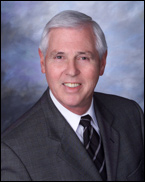Pastor and Spouse: What Do You Do When the Pain Thresholds Don’t Match?
Gerald Brooks
Gerald Brooks is the founding pastor of Grace Outreach Center, an interdenominational church in Plano, Texas. The church began in 1982 and has grown to a weekend attendance of over 5,000. Pastor Brooks is well-known for his passionate heart to help other pastors, and he mentors and teaches ministers across the country through various leadership conferences and roundtables. Pastor Brooks and his wife, Geni, have been married for 37 years and are the proud parents of three children: Wendi, Kayci, and Cody. This article is an excerpt from his new book, Understanding Your Pain Threshold, and can be ordered by clicking here.

 Recent studies have brought to the forefront some facts about Christianity. In America there are 350,000 churches that are recognized by the IRS. The average size of the church is 127 people. That’s important to remember because pastors go to conferences where the host church runs thousands of people, but that is not the average church size at all. There are only around 2,000 churches in America that run in the multi-thousands dimensions. At times this creates undue stress on pastors.
Recent studies have brought to the forefront some facts about Christianity. In America there are 350,000 churches that are recognized by the IRS. The average size of the church is 127 people. That’s important to remember because pastors go to conferences where the host church runs thousands of people, but that is not the average church size at all. There are only around 2,000 churches in America that run in the multi-thousands dimensions. At times this creates undue stress on pastors.
Those statistics are interesting to compare to that of a pastor’s tenure in ministry. In the late 1970’s and early 1980’s, the average tenure of a pastor was 30 years. The most recent study done by George Barna reported that the average pastor’s tenure these days is now 15 years. There are young people in ministry, just as there are old people in ministry. Whatever has cut the pastor’s tenure in half in past decades has nothing to do with age. If this trend continues, we won’t be able to replace the pastors who leave ministry quickly enough. We are losing talent that the kingdom of God needs.
Scripturally, the Bible is honest about this issue. In Exodus 18:17- 18, it says, “And Moses’ father in law said unto him, ‘The thing that thou doest is not good. 18 Thou wilt surely wear away, both thou, and this people that is with thee: for this thing is too heavy for thee; thou art not able to perform it thyself alone.’” Now these verses point out something that everyone who has been in ministry over a week knows: There is wear and tear that comes with ministry.
Cal Ripken Jr., who played more games in baseball consecutively than anyone else and broke Lou Gehrig’s streak, was asked how he was able to keep playing night after night. He replied, “If you are going to play night after night, you have to learn to play hurt.” I immediately took that over to ministry and found that the same concept applied. You have to learn to play hurt.
I’d venture to guess that everyone in ministry today has watched friends and colleagues succumb to the toll of temptation or the trauma of ministry. What can we do to prevent the same from happening to us? We must examine our pain threshold.
My spiritual father, Kenneth Hagin, impacted me in ways no one else has. I remember the first day that I went to school. He stood in front of the class and told us to go read the books 1 Timothy and 2 Timothy. The following Monday he did a lesson on it that caught me off guard. It included the ‘Three P’s’ of ministry:
- Purpose
- Price
- Profit
Purpose
If you’re going to make it in ministry, you have to define your God-given purpose. It can’t be your brother’s idea. It can’t be your sister’s idea. It can’t be your mama’s idea. It can’t be your dad’s idea. It can’t be because your aunt wants you to do it. It must be because you have a God-given purpose. No matter what that purpose is, if you don’t realize on the front end that there is a price to fulfilling it, you won’t make it.
Take a moment and think through the people who began in ministry with you. How many of them are left?
Price
Everyone wants to talk about the purpose and they want to talk about the profit. The people who last in ministry, however, are the people who are willing to pay the price for it. My spiritual father, in teaching this lesson, then went into great detail in 1 and 2 Timothy, where Paul talked about the sufferings and challenges of ministry. Even though I have never known anyone who talked about having faith more energetically than my spiritual father, he still stood before us and said, “If you’re going to make it, you’re going to have to understand that there is a price involved here.”
Ministry is a contact sport; you’re going to take many hits. Hurting people hurt people, and we don’t get to deal with perfect people; we deal with imperfect, hurting people. Many times, even when you’re trying to help them, you find that they are pushing back. We all know that life is not fair, and we live in a world where even as we try to help people deal with stuff, we are dealing with our own stuff. We don’t get to deal with perfect people; we get to deal with imperfect, unhealthy, hurting people.
Profit
Remember that what is at stake in ministry far exceeds any temporary reward. Ministry exists so people can go to heaven and so we can hear, “Well done, my good and faithful servant.” Let’s take a closer three men in scripture who all experience this sort of fatigue in their ministry: Elijah, Asaph, and Paul.
Elijah (1 Kings 19:4)
“And he prayed that he might die.”
He had had enough.
Asaph (Psalm 77:3)
“… I complained, and my spirit was overwhelmed.
He was over- whelmed.
Paul (Acts 20:23-24)
“… bonds and afflictions abide me. But none of these things move me.”
Troubles tried to get in the way of his motivation.
Taking these three concepts together, you have one of the reasons ministry tenure has gone from 30 years to 15 years: There are days when you feel like you’ve had enough and circumstances overwhelm you, and when you wake up the next day, more of the same stuff awaits you.
That concept is how my spiritual father introduced me to ministry. But continue to bear this principle in mind: God will never give you more than you can handle. This brings us to an uncomfortable question: what do you do if your pain threshold is different than your spouse’s?
This is important. See, on our church staff, many of the people who stepped down did so because of their marriage. H.B. London, who headed the minister’s program for Focus on the Family, was asked about ministry and marriage about how the two can work together. He answered that they seldom do. This is why your spouse’s pain threshold is so central. Two things you already know:
1. Don’t pretend the pain isn’t there – back in the 1970’s, there was a Portland Trailblazers basketball game that I recall. That night there was a player by the name of Sam Bowie who was playing the power forward position. Bowie had been an All American, and was now making millions of dollars. There came a moment in the game where Bowie was in the low block, the ball was passed to him, and he pivoted to get ready to jump and shoot. As soon as he landed, his ankle broke into multiple pieces. It literally shattered on live TV. It was one of the most horrific scenes you could see. People asked, “How could that have happened?” The reason it happened was because earlier, Bowie had been diagnosed with a small stress fracture. Instead of letting it heal, Bowie took painkillers so he could keep playing and wouldn’t feel the small stress fracture. And for a time it worked, but the fracture got bigger and bigger, until one day, on live TV, it became a compound fracture. When the pain threshold is there for us, we can’t pretend that it’s not. The Bible doesn’t teach that.
2. Make sure we keep perspective. We have to see the pain for what it is. Let’s bring the faith quotient into the mix. If you were taught faith like I was taught, then what you know is that faith is not simply denying the circumstance; faith is acknowledging that God is bigger than any circumstance that you’re in. In the name of faith, don’t look at the pain and say, “This doesn’t exist.” Instead, say, “You know what, God is bigger than this.”
The Bounce Factor
When it comes to you and your spouse, you have to understand the bounce factor. The bounce factor is illustrated in Psalm 42:11 where it says: “Why art thou cast down, O my soul?” David is talking to himself. He is saying, “You know what? I’m just feeling down.” He goes on to say in the verse, “And why art thou disquieted within me?” Clearly, David is not feeling on top of his game, and is very down. But then he bounces. “Hope thou in God: for I shall yet praise Him, who is the health of my countenance, and my God.”
Everyone processes life differently. The bounce factor for me is different than the bounce factor for my wife Geni. There are things that I bounce back differently from and there are things that she bounces back differently from me. Because the bounce factor is there, you understand the processes of life. It would be wrong for me as a husband to make Geni process the same way I do, and vice versa. Some people have higher tolerances than others, and some have lower tolerances than others.
When it comes to the bounce factor, there are several principles to factor in:
1. Identify the gaps that create vulnerability. If Geni and I are going to work together in ministry and stay together, first we must identify the areas that we bounce back differently. The Bible says that as husbands and wives, we dwell together according to knowledge. Who you marry determines more about your ministry than anything else. If you are single and called into ministry, you make decisions in light of a knowing call of God upon your life. You don’t have to compromise making that decision. So yes, you could marry someone, but are they going where you are going? Are they willing to do what God has called you to do? Your spouse will determine more about what you do than anything. The next questions to ask are: Who bounces back in your family? Who has the highest bounce factor? How soon do they bounce back? When ministry starts getting intense, it starts hitting your home life. Frustration will build. You have to know that bounce factor.
2. Lead at a pace others can follow. In Genesis 33:14 (NKJV), it says, “Please let my lord go on ahead before his servant. I will lead on slowly at a pace which the livestock that go before me and the children are able to endure…” What Jacob was saying here was, “You know what, I can walk at a fast pace, but that pace will kill everyone around me. In Oswald Sanders’ book on Christian leadership, he writes that one of the tendencies of high capacity leaders is to move so quickly that pretty soon the people who want to follow them can no longer see them. Because leaders are high engagement, highly driven individuals, the easiest thing to do is to create a pace that is too great for people around them to keep up with. You have to determine the pace given the ministry that you have, considering the bounce factor that exists. You have to determine a pace that works within the spectrum of your family.
3. Don’t quit challenging. When the people we lead can no longer see us, it’s not that they reject us; they just can’t follow us because we are no longer in sight. So pray, “Lord, I know what you want me to do, but how do I accomplish it at a pace that challenges?” As a leader I never quit challenging people around me. I want to challenge them, but not cripple them. So every Monday I ask myself, “At what pace am I challenging us to grow?” and “At what pace am I crippling us to minister?” I didn’t know that early on, because I just assumed that everyone worked at my pace. I quickly found that everyone is not wired the same way I am, and they may work at a different pace than me.
4. Remember that ministry has a price. It says in Ecclesiastes 4:10, “For if they fall, the one will lift up his fellow: but woe to him that is alone when he falleth; for he hath not another to help him up.” One person can’t pay the entire price for the other. When it comes to surviving in ministry, God puts certain people in our lives. We need them. But one of you can’t always be the one who gets to have the problem. There are days that I am down, and there are days that Geni is down. It can’t just be one of us that gets to have down days. Something that counselors will tell you is that when a husband is always expecting of the wife, or the wife is always expecting of the husband, the relationship will soon deteriorate. Spiritually speaking, there are days where you are not on top of your game mentally, physically, or spiritually, but it can’t be that way forever. One of the things I look for when hiring is whether that person can do the job. Then I look at their mate and see how long they will do the job. I may look at a potential youth pastor and ask questions like, “Does he have the right personality?” “Does he have that gift?” “Can he lead the young people of the church into functioning relationships with God?” But then I will look at his wife and ask, “What do I know about her?” “Is she stable?” “Will she support his ministry or discourage him from it?” Everyone goes home and complains about their job. I do. If the person at home just looks at them and says, “I agree,” then that ministry won’t last too long. The person at home either stabilizes or irritates.
5. Look for trigger points. What bothers you may not bother your spouse. I have found, in talking with pastors, that most guys are bothered by the problem itself, while most women are bothered by the people who caused the problem. Men get bugged by the problem and think about how to come up with a solution and how to work the problem. But I have found that pastor’s wives are so much more bothered by what a person said rather than the problem they caused. Knowing what the trigger points are will tell you what motivates the pain threshold. God designed it like that so that you can protect each other.
6. Talk about the issues. Proverbs 27:17 says, “Iron sharpeneth iron; so a man sharpeneth the countenance of his friend.”Get the trigger point out in the open. Cover-ups are never good. Discuss it and be aware of it. Decide your obvious goals together and have those out in the open. State the simple goals like, “I want to reach lost people,” or, “I want to stay married and at the end of this life to look at my wife and say, ‘There were good days and there were bad days, but we made it through all the days, thanks be to God.’” A part of that is being aware of your tendencies, but you also have to make a decision. Decide that crossing the finish line without each other is not an option.
7. Understand that the people you pastor won’t get it. Years ago, I heard Buddy Harrison speak, and he introduced the verse Acts 26:17 to me. It says, “Delivering thee from the people, and from the Gentiles, unto whom now I send thee.” Until you’re free from the people to the point that they do not determine your security or your insecurity, you will not be able to minister to them. This is tough because we love our people, we care for our people, and we are committed to our people. But our security cannot come from the people. Whether they come to church or they don’t come, it’s alright.
8. Make sure you have each other’s back. The other person must know what you call unpardonable sins. At Grace Outreach Center, my unpardonable sin is messing with my family. You don’t get to mess with my family. Do I know that sometimes my family doesn’t do everything the way they should? Absolutely. But that doesn’t give anyone a right in my eyes to mess with them. Sometimes people will come up to me and say something about my wife. That is a bridge too far, and I’ll look at them and say, “You know the wonderful thing about Plano is that there are a lot of great churches, and I know you’ll find one somewhere else.” People will come up to me and say that they know my kids did this or that and I’ll think, “Man, you don’t know half the things my kids have done.” They don’t get to mess with my kids, no matter what they’ve done. For Geni, the same principal applies. I remember once I had been up all night with a young man who died. I had been holding his hand when he took his last breath. I went home after that exhausted, and I went to sleep. A lady from our church called and told Geni that she wanted to meet with the pastor. Geni told the lady that I wasn’t available. The woman replied, “Well he needs to be available to people. I guess you have to be dying to get attention from the pastor.” I remember Geni’s voice at that point, because up until then I had been asleep. At that point she raised her voice and insisted that she was not to be used as a back door to get to me. No one was to say, “Hey Geni, tell Gerald this.” Geni and I have each other’s back, and in that way we are able to manage each other’s pain threshold.

 Question: Is it okay to use air miles and points that were accumulated based on ministry-paid purchases or travel, and redeem those miles and points for personal items or trips in the future? Also, is this considered to be taxable income?
Question: Is it okay to use air miles and points that were accumulated based on ministry-paid purchases or travel, and redeem those miles and points for personal items or trips in the future? Also, is this considered to be taxable income?
 We all know about Joseph and Mary, the Inn of Bethlehem, the shepherds, the star, and the wise men. They’re all part of the wonderful story we remember and tell this time of year. There’s more to the story, though. Obscure and often overlooked, buried in Matthew’s genealogy and leading up to the birth of Christ are four women.
We all know about Joseph and Mary, the Inn of Bethlehem, the shepherds, the star, and the wise men. They’re all part of the wonderful story we remember and tell this time of year. There’s more to the story, though. Obscure and often overlooked, buried in Matthew’s genealogy and leading up to the birth of Christ are four women. On January 26, 2010 at 1:15am, I suddenly woke up from a deep sleep and God spoke four words very loud and clear in my heart, “THE TITHE IS HOLY!”
On January 26, 2010 at 1:15am, I suddenly woke up from a deep sleep and God spoke four words very loud and clear in my heart, “THE TITHE IS HOLY!” Several years ago there was a commercial on television which said, “It’s 10:00 O’clock. Do you know where your children are?” If we move that into the realm of your church finances, we could restate it this way: “It’s the end of the year. Do you know where your money went?”
Several years ago there was a commercial on television which said, “It’s 10:00 O’clock. Do you know where your children are?” If we move that into the realm of your church finances, we could restate it this way: “It’s the end of the year. Do you know where your money went?” While the new pastor may be the leader by position, he may not in actuality be the true leader of the church. Many pastors function as “chaplains” (pastor without proper Biblical authority); that is, they perform the “priestly functions” such as preaching, performing weddings, funerals, baptisms, etc. They are available when needed, whereas a pastor who is the true leader is the one to whom the people look for direction. He is out front showing the way and the people follow. Most pastors begin as “Chaplains” and move toward being the true leader (pastor with proper Biblical authority). This process is often painful and will sometimes take five or more years (much shorter if the pastor is the founder of a new church).
While the new pastor may be the leader by position, he may not in actuality be the true leader of the church. Many pastors function as “chaplains” (pastor without proper Biblical authority); that is, they perform the “priestly functions” such as preaching, performing weddings, funerals, baptisms, etc. They are available when needed, whereas a pastor who is the true leader is the one to whom the people look for direction. He is out front showing the way and the people follow. Most pastors begin as “Chaplains” and move toward being the true leader (pastor with proper Biblical authority). This process is often painful and will sometimes take five or more years (much shorter if the pastor is the founder of a new church).
 I had just gone to lunch with a pastor friend that afternoon and by 9 p.m. the same night he was calling me to say: “remember that couple I was telling you about, well they are in suicidal crisis and going to the hospital.” His next set of questions might mirror some of the questions you might have had: How do I help? What do I say? How can I let this family know that they are loved and cared for? How can I help get them get hooked up with professional help, especially if they are resistant to my suggestions thus far? As we talked into the night, and dealt with the crisis at hand, I realized that suicide is not talked about enough in my own faith community. It also made me realize the importance of the intersection between mental health and faith communities.
I had just gone to lunch with a pastor friend that afternoon and by 9 p.m. the same night he was calling me to say: “remember that couple I was telling you about, well they are in suicidal crisis and going to the hospital.” His next set of questions might mirror some of the questions you might have had: How do I help? What do I say? How can I let this family know that they are loved and cared for? How can I help get them get hooked up with professional help, especially if they are resistant to my suggestions thus far? As we talked into the night, and dealt with the crisis at hand, I realized that suicide is not talked about enough in my own faith community. It also made me realize the importance of the intersection between mental health and faith communities. 

 Question #1: When Should We Pray?
Question #1: When Should We Pray? The following points are from Mike Mazzei’s book, “Solving Your Financial Planning Puzzle.” Click here to find out more about this book.
The following points are from Mike Mazzei’s book, “Solving Your Financial Planning Puzzle.” Click here to find out more about this book.  Dale Marples and his wife, Betty Jo, are ordained through Rhema Bible Training Center and had been pastors for 24 years before retiring in 2010. They pioneered 3 churches during that time. Dale has a degree from the University of Nebraska in Business Administration and Finance. After serving as an officer and pilot in the U.S. Air Force he became a National Bank Examiner and Executive Officer in banking for 25 years. Dale also was Director of Treasury and Budget for the Oral Roberts Evangelistic Association for several years.
Dale Marples and his wife, Betty Jo, are ordained through Rhema Bible Training Center and had been pastors for 24 years before retiring in 2010. They pioneered 3 churches during that time. Dale has a degree from the University of Nebraska in Business Administration and Finance. After serving as an officer and pilot in the U.S. Air Force he became a National Bank Examiner and Executive Officer in banking for 25 years. Dale also was Director of Treasury and Budget for the Oral Roberts Evangelistic Association for several years. As the pastor of a church, you are the spiritual leader for preaching the Word and ministering to the congregation. You are also the CEO of a business. God called you to the ministry, but you inherited the CEO responsibility. In Bible School you were taught the Word and how to minister the Word but the financial management of the church was not part of the curriculum. This is not a criticism of the Bible School because they only have so much time to teach and the priority is the Word, which it should be.
As the pastor of a church, you are the spiritual leader for preaching the Word and ministering to the congregation. You are also the CEO of a business. God called you to the ministry, but you inherited the CEO responsibility. In Bible School you were taught the Word and how to minister the Word but the financial management of the church was not part of the curriculum. This is not a criticism of the Bible School because they only have so much time to teach and the priority is the Word, which it should be. The “sharp sword with two edges” in Revelation 2:12 represents Christ’s ultimate authority in all matters, including those of life and death. However, there is another important insight to be gleaned from this symbolism as well.
The “sharp sword with two edges” in Revelation 2:12 represents Christ’s ultimate authority in all matters, including those of life and death. However, there is another important insight to be gleaned from this symbolism as well.
 Recent studies have brought to the forefront some facts about Christianity. In America there are 350,000 churches that are recognized by the IRS. The average size of the church is 127 people. That’s important to remember because pastors go to conferences where the host church runs thousands of people, but that is not the average church size at all. There are only around 2,000 churches in America that run in the multi-thousands dimensions. At times this creates undue stress on pastors.
Recent studies have brought to the forefront some facts about Christianity. In America there are 350,000 churches that are recognized by the IRS. The average size of the church is 127 people. That’s important to remember because pastors go to conferences where the host church runs thousands of people, but that is not the average church size at all. There are only around 2,000 churches in America that run in the multi-thousands dimensions. At times this creates undue stress on pastors. On Monday, June 19, 2000, my wife, Paula, and I were attending the MWPA (Midwest Word of Faith Pastors Association) Family Camp in Green Lake, Wisconsin. A time of praise and worshipping God had just concluded and the first speaker of the week had been introduced, but before he opened his Bible, Rev. Al Gluchoski gave an utterance in other tongues. Very much to my surprise, he pointed down to the end of the front row where I was seated and said, “Please come up here. That was for you.” After I did, he gave the interpretation, which started out, “The Lord is about to make you a person of influence with persons of influence….” I was certainly interested in what this might mean, and on the way back to my seat, in my spirit I heard the words, “Chaplain with the La Crosse Police Department.” I had been in pastoral ministry for 16 years at that point and had never even heard of – let alone pursued – police chaplaincy; furthermore, I didn’t have the foggiest idea of how I might go about pursuing it. Little did I know, I didn’t have to. Upon returning home from that conference, I found in our mail a letter of invitation signed by Chief Ed Kondracki of the La Crosse Police Department inviting me to an informational meeting in mid-July concerning the forming of a brand new program within the department – a police chaplaincy program!
On Monday, June 19, 2000, my wife, Paula, and I were attending the MWPA (Midwest Word of Faith Pastors Association) Family Camp in Green Lake, Wisconsin. A time of praise and worshipping God had just concluded and the first speaker of the week had been introduced, but before he opened his Bible, Rev. Al Gluchoski gave an utterance in other tongues. Very much to my surprise, he pointed down to the end of the front row where I was seated and said, “Please come up here. That was for you.” After I did, he gave the interpretation, which started out, “The Lord is about to make you a person of influence with persons of influence….” I was certainly interested in what this might mean, and on the way back to my seat, in my spirit I heard the words, “Chaplain with the La Crosse Police Department.” I had been in pastoral ministry for 16 years at that point and had never even heard of – let alone pursued – police chaplaincy; furthermore, I didn’t have the foggiest idea of how I might go about pursuing it. Little did I know, I didn’t have to. Upon returning home from that conference, I found in our mail a letter of invitation signed by Chief Ed Kondracki of the La Crosse Police Department inviting me to an informational meeting in mid-July concerning the forming of a brand new program within the department – a police chaplaincy program! One thing that every non-profit organization has in common is the need for ongoing donations and the end of the calendar year presents a huge opportunity. Year end is a time for donors to realize that they need to take steps to reduce their taxes and one of the few good ways left in the tax code to do this is via charitable gifting.
One thing that every non-profit organization has in common is the need for ongoing donations and the end of the calendar year presents a huge opportunity. Year end is a time for donors to realize that they need to take steps to reduce their taxes and one of the few good ways left in the tax code to do this is via charitable gifting. 